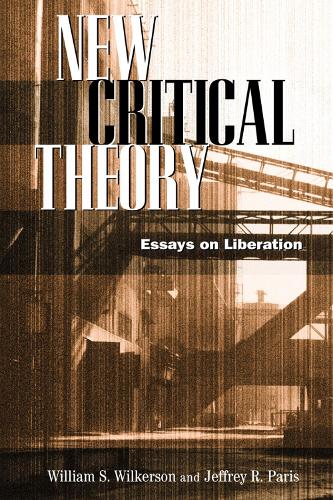
New Critical Theory: Essays on Liberation
(Paperback)
Publishing Details
New Critical Theory: Essays on Liberation
By (Author) William S. Wilkerson
By (author) Jeffrey Paris
Bloomsbury Publishing PLC
Rowman & Littlefield Publishers
19th November 2001
United States
Classifications
General
Non Fiction
Political control and freedoms
301.01
Physical Properties
Paperback
288
Width 150mm, Height 226mm, Spine 16mm
381g
Description
An edited collection of all new work in the area of new critical theory, intended to serve as a signature volume for the New Critical Theory Series. The volume, like the series as a whole, is designed to capture the present moment in postdisciplinary theory, as the older tradition of critical theory in the Frankfurt School sense comes together with postmodernism and the new critical theory. It represents the dialogue that is taking place among the various strands of theory and can serve as a survey of contemporary leftist philosophy.
Reviews
This collection brings together some of the most exciting voices writing in critical theory today. The essays included in the volume show us how critical theory can be expanded to include the burning issues of multiculturalism; racial, ethnic, and language politics; and the pressing demands of feminism. -- Drucilla Cornell, Rutgers University, author of Todays Struggles, Tomorrows Revolutions
In this collection, Wilkerson and Paris have brought together seasoned veterans of critical theory such as Douglas Kellner, Andrew Feenberg, and James L. Marsh with a new generation of critical theorists including Patricia Huntington, Eduardo Mendieta, Bill Martin, and Cynthia Willett. Although there is no single perspective that unites the authors across topics ranging as widely as the Chiapas Rebellion, queer theory, African-Amercian notions of 'subjectivity,' and Marcuse's early debts to Heidegger, what they share in common is the attempt to renew the critical, radical edge of what we might think of as a 'critical theory industry' dominated by Habermasians. A new, post-Habermasian critical theory finds greater inspiration in the radicalism of HerbertMarcuse than in the critical-theoretic rapprochement with liberalism that has characterized its mainstream development in the United States over the past couple of decades. Anyone interested in answering the question Nancy Fraser once asked, 'What's Critical About Critical Theory,' will be informed and challenged by this volume. The critical theory that appears here is especially noteworthy for its willingness to learn from and engage in constructive dialogues with postmodernism, feminism, postcolonial t -- Thomas Jeannot, Gonzaga University
An important, philosophically sophisticated book that ought to be read by anyone who has felt the pull of philosophical dissonance. It is a book that ought to be read by all those who are intellectually accustomed to reading the works of those who continue to testify against continuing injustice. It is also a book that demands to be read by all of those frustrated by the futile in-fighting that has dogged Critical theory for several decades. This book has the potential for cunstructing new bridges both between the various clans that comprise Critical theory and across to other intellectual traditions that have been unduly neglected by an overly canonical reading of Critical theory. -- Andrew Fagan, University of Essex
New Critical Theory is an important, philosophically sophisticated book that ought to be read by anyone who has felt the pull of philosophical dissonance. It is a book that ought to be read by all those who are intellectually accustomed to reading the works of those who continue to testify against continuing injustice. It is also a book that demands to be read by all of those frustrated by the futile in-fighting that has dogged Critical theory for several decades. This book has the potential for constructing new bridges both between the various clans that comprise Critical theory and across to other intellectual traditions that have been unduly neglected by and overly canonical reading of Critical theory. * Philosophy in Review *
One is unlikely to encounter an anthology on recent applications of critical theory that is as thorough in its coverage as this one. The editors have done a terrific job assembling an all-star cast of scholars; the writing is impassioned and the territory coveredfrom philosophical foundations and postmodern challenges to globalization, technology, post-colonialism, race, gender, and sexual orientationis fresh and exciting. -- David Ingram, Loyola University, Chicago
In this collection, Wilkerson and Paris have brought together seasoned veterans of critical theory such as Douglas Kellner, Andrew Feenberg, and James L. Marsh with a new generation of critical theorists including Patricia Huntington, Eduardo Mendieta, Bill Martin, and Cynthia Willett. Although there is no single perspective that unites the authors across topics ranging as widely as the Chiapas Rebellion, queer theory, African-Amercian notions of 'subjectivity,' and Marcuse's early debts to Heidegger, what they share in common is the attempt to renew the critical, radical edge of what we might think of as a 'critical theory industry' dominated by Habermasians. A new, post-Habermasian critical theory finds greater inspiration in the radicalism of Herbert Marcuse than in the critical-theoretic rapprochement with liberalism that has characterized its mainstream development in the United States over the past couple of decades. Anyone interested in answering the question Nancy Fraser once asked, 'What's Critical About Critical Theory,' will be informed and challenged by this volume. The critical theory that appears here is especially noteworthy for its willingness to learn from and engage in constructive dialogues with postmodernism, feminism, postcolonial theory, and multiculturalism, moving its readers beyond the increasingly sterile debates that dominate the ivory tower, to the concrete, world-historical struggles for liberation on which the soul, the vitality, and ultimately the future of critical theory depends. -- Thomas Jeannot, Gonzaga University
Author Bio
William S. Wilkerson is assistant professor of philosophy at the University of Alabama in Huntsville. Jeffrey R. Paris is visiting professor at the University of San Francisco.
